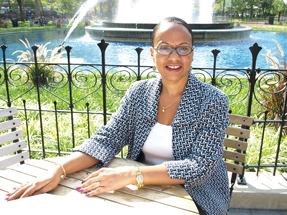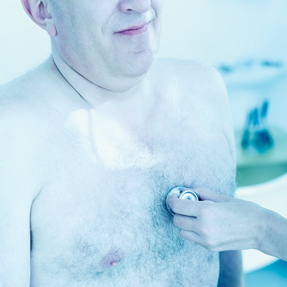Treating HIV, teaching trainees motivate this internist
Valerie E. Stone, MD, FACP.
Valerie E. Stone, MD, FACP

Age: 53
Occupation: General internist/infectious disease physician (specializing in HIV), director of primary care internal medicine residency, associate chief for teaching and training of general medicine division, all at Massachusetts General Hospital; professor of medicine at Harvard Medical School.
Current residence: Quincy, Mass.
Hometown: Montclair, N.J.
Family: Lives with long-term partner, stepdaughter (who is mostly away at college at Georgetown University) and two dogs, Cosmopolitan and Montenegro.
Training
Medical school: Yale University.
Residency: Case Western Reserve University hospitals, Cleveland.
Fellowship: Infectious disease at Boston University hospitals.
Something I wish I'd learned in medical school: More health policy. It is so critical to what we're able to do for patients, yet it usually receives very few hours in the medical school curriculum.
Career
I became an internist because: When I was young, several close family members became seriously ill and received care that resulted in poor outcomes. What I realized I was seeing were disparities in care, in part because they were minorities, in part because they were relatively poor. So I went into medicine to try to make a difference in the care of minorities and disadvantaged patients, and to work to eliminate disparities in care.
First job: Director of ambulatory care services at Boston City Hospital.
Most rewarding aspect of my job: Providing excellent state-of-the-art care for patients living with HIV/AIDS. I've been an AIDS doctor for 25 years now, and there's been so much positive change in the care of patients with HIV. It's amazingly gratifying to see how far we've come. The patients are often not just appreciative, but amazed that we can now treat HIV with relatively simple medical regimens with few side effects, and restore their quality of life as well as their life expectancy.
Most meaningful professional accomplishment: Many people have been talking about the fact that I've recently become the first African-American full professor in the department of medicine at Harvard Medical School, and the first African-American woman professor at Mass General. I am both excited and humbled by this accomplishment. But when I look at the big picture, my most important professional accomplishment is the number of really gifted young people that I've had the privilege of training in our primary care residency program and mentoring, who are now making a difference too—in primary care practice, health policy, global health, as well as in academic medicine. Their contributions have multiplied my impact; this is one of the many reasons that I find teaching and mentoring so very rewarding.
Future goals: I would love to have a leadership position in which I could work with others to develop innovative strategies to improve access to primary care and increase the number of young physicians who enter and enjoy primary care careers.
Hardest medical lesson learned: I initially entered a residency in OB/GYN. I was very interested in women's health, so I thought it would be the right choice. A few months into residency, I realized that it wasn't the field for me, because I really wanted to take care of all of the patients' problems not just their reproductive care, and I wanted to care for men as well as women. Most of my education and my life, I've kept going forward, but I did make a wrong turn there. As a result of this experience, I think I bring a humility to mentorship when I am talking to young people. Now I am the first to admit that sometimes you don't know the right field until you try it on, and it's okay if you need to make a change in your career direction.
Personal
Personal hero: David Satcher, MD. He did such an amazing job as Surgeon General, really bringing the country together through the Healthy People 2010 process and increasing the national dialogue about disparities.
Favorite ways to spend free time: Reading, walking on the beach with my dogs.
Favorite authors: Pearl Cleage and Toni Morrison.
Most recent books read:Cutting for Stone by Abraham Verghese and Resonant Leadership by Richard Boyatzis.
Most meaningful non-medical accomplishment: Getting my book published on HIV/AIDS in U.S. communities of color.
Item I can't live without: I would love to say something creative or unusual, but the bottom line is it's either my iPhone or my laptop.
Most surprising thing about me: I'm a nascent wine connoisseur.
Biggest regret: I really don't have any. I have enjoyed all the twists and turns. I've learned something from every experience. I wish I had known that from the beginning, that the journey is very rewarding and fulfilling even when things aren't going perfectly.
If I weren't a physician, I would be: The chef/owner of a seafood-focused restaurant on the water in Martha's Vineyard or Provincetown, Mass.




